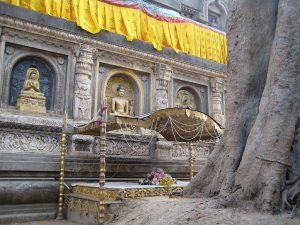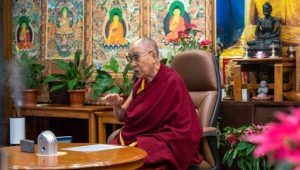
Pope Francis met with Buddhists along with practitioners of Shinto, Shamanism, Russian Orthodox Christianity, and other religious traditions at an inter-religious dialogue event in predominantly Buddhist Mongolia on Sunday. In addition to praising the practice of interfaith dialogue, the pontiff quoted the Buddha’s words in the Dhammapada at the gathering during the first-ever papal visit to the country of 3.4 million people.
Speaking on inter-religious dialogue, the pope said that that it was “not antithetical to proclamation” and instead that it helped people from various religious traditions to understand one another: “With humility and in the spirit of service . . . the Church offers the treasure she has received to every person and culture, in a spirit of openness and in respectful consideration of what the other religious traditions have to offer.” (CNA)
“Religious traditions, for all their distinctiveness and diversity, have impressive potential for the benefit of society as a whole,” he added. (CNA)
Khamba Nomun Khan, the supreme head of Mongolian Buddhists and abbot of Gandan Monastery in Ulaanbaatar, accompanied Pope Francis as he entered the inter-religious event, held on Bogd Khan Uu mountain, overlooking Mongolia’s capital.
The pope cited the Dhammapada twice in his speech, including the verse: “The fragrance of flowers spreads only in the direction of the wind, the fragrance of those who live according to virtue spreads in all directions.” (CNA)
Buddhist Monk Altankhuu Tserenjav of the Zuun Khuree Dashichoiling Monastery in Ulaanbaatar, Mongolia on what it means to his Buddhist community to be meeting Pope Francis today. #PopeInMongolia pic.twitter.com/w1kGWAoBFC
— Courtney Mares (@catholicourtney) September 3, 2023
Mongolia has a rich religious history. It was home to an estimated 110,000 Buddhist monks and some 700 monasteries at the turn of the 20th century. However, under the rule of the Mongolian People’s Party, which took power in 1921, many of the monasteries were destroyed and countless monks were either killed or forced into lay life.
After the Democratic Revolution of 1990 and the drafting of a new constitution enshrining religious freedom in 1992, Buddhism has seen a steady return.
“May the memory of past suffering—here I think especially of the Buddhist communities—bestow the strength needed to transform dark wounds into sources of light, senseless violence into the wisdom of life, devastating evil into constructive goodness,” Pope Francis said at the meeting on Sunday. (CNA)
Earlier this year, His Holiness the Dalai Lama recognized a US-born boy as the 10th Khalkha Jetsun Dhampa (also known as the Jebtsundamba Khutughtu) in a ceremony in India.* The recognition continues a lineage of rebirths that dates to 1635 with the birth of the First Jebtsundamba Khutughtu, Öndör Gegeen Zanabazar. The lineage holds the title Bogd Gegeen, noting their status as the highest-ranking lamas in Mongolia.
In a speech on Saturday, the pope praised the relative stability brought by the Mongol Empire in the 13th century, calling for a similar peace to be established today: “May heaven grant that today, on this Earth devastated by countless conflicts, there be a renewal, respectful of international laws, of the condition of what was once the Pax Mongolica, that is the absence of conflicts.” (PBS)
The interfaith event was held on the third day of Pope Francis’ five-day visit to Mongolia. His trip wrapped up on Monday with a private mass at Ulaanbaatar’s Steppe Arena before nearly all of the country’s 1,450 Catholics.
Video highlights of Pope Francis’ encounter with Mongolia's ecumenical and religious leaders at the Hun Theatre in Ulaanbaatar.#PopeInMongoliahttps://t.co/6w3fus3hcM pic.twitter.com/clNFJMeWhs
— Vatican News (@VaticanNews) September 3, 2023
* Dalai Lama Recognizes US-Born Boy as Highest Ranking Lama in Mongolia (BDG)
See more
Pope Francis quotes Buddha at interreligious event in Mongolia (CNA)
Representative Telo Tulku Rinpoche Welcomes India’s Lok Sabha Speaker Honourable Om Birla to Mongolia (Central Tibetan Administration)
Pope Francis praises Mongolia for centuries of religious freedom as he starts his visit (PBS)
Pope Francis and Mongolia’s Catholics under one roof at papal Mass (Reuters)
Related news reports from BDG
Buddhist Leaders to Take Part in Interfaith Dialogue with Pope Francis in His First Trip to Mongolia
Mongolian Kanjur from India’s Ministry of Culture Distributed in Russia
The Mongolian Buddhist Canon as a Symbol of Cultural Dialogue between India and Mongolia: An Interview with Prof. Shashi Bala
The Heritage of Buddhist Women in Mongolia: A Conversation with Kunze Chimed
For the Next Generation: A Conversation with Mongolian Civic Leader…
Mongolia: A Complex Dance Survival
Mongolian Tsam, Socialist Realism: People’s Painter Urjingiin Yadamsuren
Related features from BDG
Buddhistdoor View: Tengri meets the Trinity: Pope Francis’ Visit to Mongolia
Mongolian Kanjur from India’s Ministry of Culture Distributed in Russia
Related posts from BDG’s Tea House Blog
Indica et Mongolica: Four Relics of the Buddha in Ulaanbaatar












